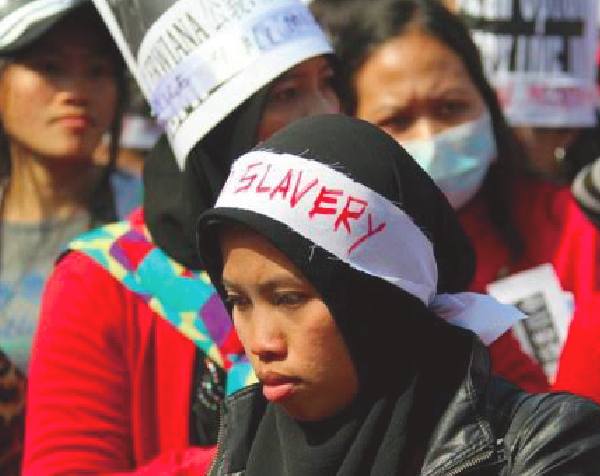Hong Kong’s 340,000 foreign domestic workers have the longest work days of all groups, in a city with the longest working hours in the world.
Adam N Lee
A recent poll by Mission for Migrant Workers finds that almost two of five (38%) domestic workers work more than 16 hours a day, while the rest (62%) say they work more than 11 hours daily.
The long working day is one of three major burdens weighing upon these women workers. The others are lack of privacy, because they are forced to squeeze into their employer’s often cramped home, and the excessive fees demanded by recruitment agencies.

The agencies are parasites that prey on migrant women ostensibly by arranging their placement and employment contracts. By Hong Kong law they are not allowed to charge fees exceeding 10 percent of a worker’s first monthly salary, a total fee of HK$431. But the poll showed the law is only followed in four percent of cases. Nearly half of the women said they were charged fees of between HK$5,000 and HK$10,000 and one if five paid over HK$15,000, which is equivalent to more than three months’ salary.
The agencies use strong-arm tactics like confiscating a worker’s passport, employment contract and even ATM cards. They circumvent the law by inventing fake services such as ‘training’ to increase the amount of fees they charge. The Hong Kong government knows about and largely turns a blind eye to these abuses. There are over 2,500 licensed agencies operating in Hong Kong and in the whole of 2015 just nine agencies were convicted of overcharging. The agencies make such profits that the fines – typically HK$20,000 to HK$30,000 – can be written off as part of their budget.
The role of the agencies forces large numbers of migrant women workers – over half according to surveys – into debt. In March this year, a case went before the courts of a loan sharking syndicate that preyed upon over a thousand Filipino domestic workers, demanding interest rates of 120 percent per year.
Socialist Action demands the abolition of the agencies to be replaced by a single statutory and non-profit employment service under public management and control. Domestic workers need to get organised side-by-side with local workers to fight for their rights, by building strong trade unions and demanding equal treatment, equal pay and an eight-hour work day without loss of pay.




